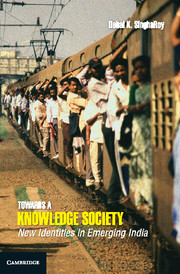Book contents
- Frontmatter
- Contents
- List of Tables and Figures
- Preface
- 1 Introduction: Conceptualising Knowledge Society: Critical Dimensions and Ideal Image
- 2 Critiquing and Contextualising Knowledge Society
- 3 Strategising for Knowledge Society in India: The Shifting Backdrops and Emerging Contexts
- 4 Education for Knowledge Society in India
- 5 Information and Communication Technologies for Knowledge Society
- 6 Indian Growth Story: Service and Knowledge Dynamics
- 7 Education, ICTs and Work: The Divergent Empirical Reality
- 8 Knowledge Society: Work, Workers and Work Relations
- 9 Knowledge Society: Culture, Continuity and Contradictions
- 10 Conclusion: Marginality, Identity, Fluidity and Beyond
- Bibliography
- Index
4 - Education for Knowledge Society in India
Published online by Cambridge University Press: 05 August 2014
- Frontmatter
- Contents
- List of Tables and Figures
- Preface
- 1 Introduction: Conceptualising Knowledge Society: Critical Dimensions and Ideal Image
- 2 Critiquing and Contextualising Knowledge Society
- 3 Strategising for Knowledge Society in India: The Shifting Backdrops and Emerging Contexts
- 4 Education for Knowledge Society in India
- 5 Information and Communication Technologies for Knowledge Society
- 6 Indian Growth Story: Service and Knowledge Dynamics
- 7 Education, ICTs and Work: The Divergent Empirical Reality
- 8 Knowledge Society: Work, Workers and Work Relations
- 9 Knowledge Society: Culture, Continuity and Contradictions
- 10 Conclusion: Marginality, Identity, Fluidity and Beyond
- Bibliography
- Index
Summary
Education as a Critical Investment and Mainstreaming Mechanism
Education has always remained a key factor of human development and economic reconstruction of a country and its national integration. Accordingly, all nation states frame policies on education that promote, generate and circulate skilled and educated manpower and train and socialise the new generation keeping in view both the short-and long-term needs of the nation. In knowledge society, the significance of education has been multiplied to become the key means for generation of wealth and employment, formation of knowledge-based networks, ushering of knowledge and technological revolution, converting knowledge as the main source of livelihood and mobility, integration of society with the global socioeconomic and technological forces and transformation of all members as creative beings. Education in this society is not an end in itself, but a means of social welbeing and a source for collective use and reflection. It is no more a social service, but a long-term investment that aims to ensure inexhaustible development of the country through mass production and application of knowledge by cultivating human brains for a desired end. With the knowledge and ICTs revolution in the offing, most nations are now profoundly engaged in creating, organising, accessing and processing and recirculating knowledge in an unprecedented speed so as to ensure their place in the advantage of emerging knowledge society.
- Type
- Chapter
- Information
- Towards a Knowledge SocietyNew Identities in Emerging India, pp. 94 - 136Publisher: Cambridge University PressPrint publication year: 2014



